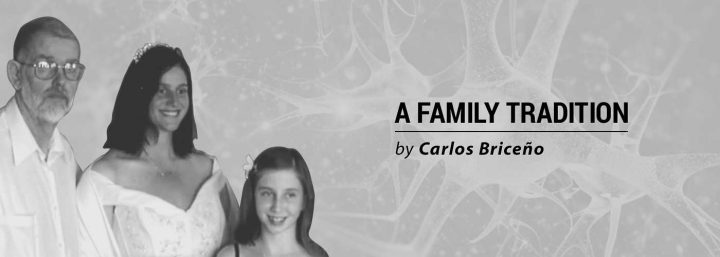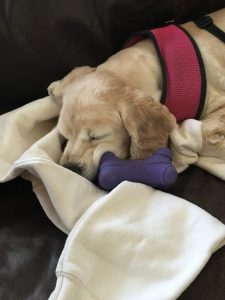I Have a Unique Background as a Caregiver

I’m not a nurse or a social worker. In other words, I haven’t received formal training in caregiving from a college or a university. But I do feel that I’m prepared to do well as a caregiver because of the training I received as a child.
I grew up in a home where my mom’s moods — it turns out she’s bipolar — dictated whether she would be calm, which was rare, or explosively angry, which was often. She also was depressed, anxious, and battled agoraphobia. I remember often staying at home from school as a child because she didn’t feel well and needed someone to take care of her.
From her body language to the way she said things, I instantly knew what she needed, or didn’t need, and then reacted accordingly. This kind of training resulted in me developing a deep instinct for empathy. Through subtle clues, I can feel how someone else is feeling. As a result, I think my childhood provided me with a black belt in caregiving.
At home, my dog, Baby Girl, is the recipient of this special superpower. A year ago, she suffered an injury to her back called canine intervertebral disc disease, which paralyzed her legs for several weeks. The veterinarian suggested surgery or resting in a crate with little movement for several weeks. We couldn’t afford expensive surgery, so my wife, Jill, and I confined her to a crate.
I was the one who picked her up, brought her down the stairs of our town home apartment, and held her up in the yard, her legs uselessly dangling below her as she went to the bathroom. About a month later, she regained movement and strength in her legs, and though she is still a little wobbly, she can walk.
But remembering how tragic it was when she couldn’t move her legs, the thought of her walking up and down the stairs of our home, legs going out from under her, has compelled me to carry her every time I take her outside.
She’s a cocker spaniel and weighs about 30 pounds, so she’s not light. But I don’t want to see her hurt again. So I have carried her up and down the stairs for more than a year.
Jill and I live in the Midwest, where the weather can turn icy, which leads to salt being tossed on the sidewalks in our apartment complex. The salt causes Baby Girl’s paws to become irritated when she goes outside, so I end up carrying her over the parts of the sidewalk that are heavily salted.
As much as I love my dog, I love my wife more. After her Huntington’s diagnosis in 2018, I have tried to be as attentive to her needs as I was with my mom and our dog. For instance, every time she goes to the doctor’s office at the local Huntington’s Center of Excellence, I take time off work to be with her, no matter how busy I am. I plan to do that every time she needs to go to the doctor’s office in the years ahead.
I realize that caregiving is a marathon for those who have a spouse with a terminal illness. But I’ve been training for a marathon since I was a child, and I feel prepared for whatever is in store. I will make sure that Jill gets the highest quality of care from me because she deserves it.
***
Note: Huntington’s Disease News is strictly a news and information website about the disease. It does not provide medical advice, diagnosis, or treatment. This content is not intended to be a substitute for professional medical advice, diagnosis, or treatment. Always seek the advice of your physician or other qualified health provider with any questions you may have regarding a medical condition. Never disregard professional medical advice or delay in seeking it because of something you have read on this website. The opinions expressed in this column are not those of Huntington’s Disease News or its parent company, Bionews Services, and are intended to spark discussion about issues pertaining to Huntington’s disease.








Leave a comment
Fill in the required fields to post. Your email address will not be published.